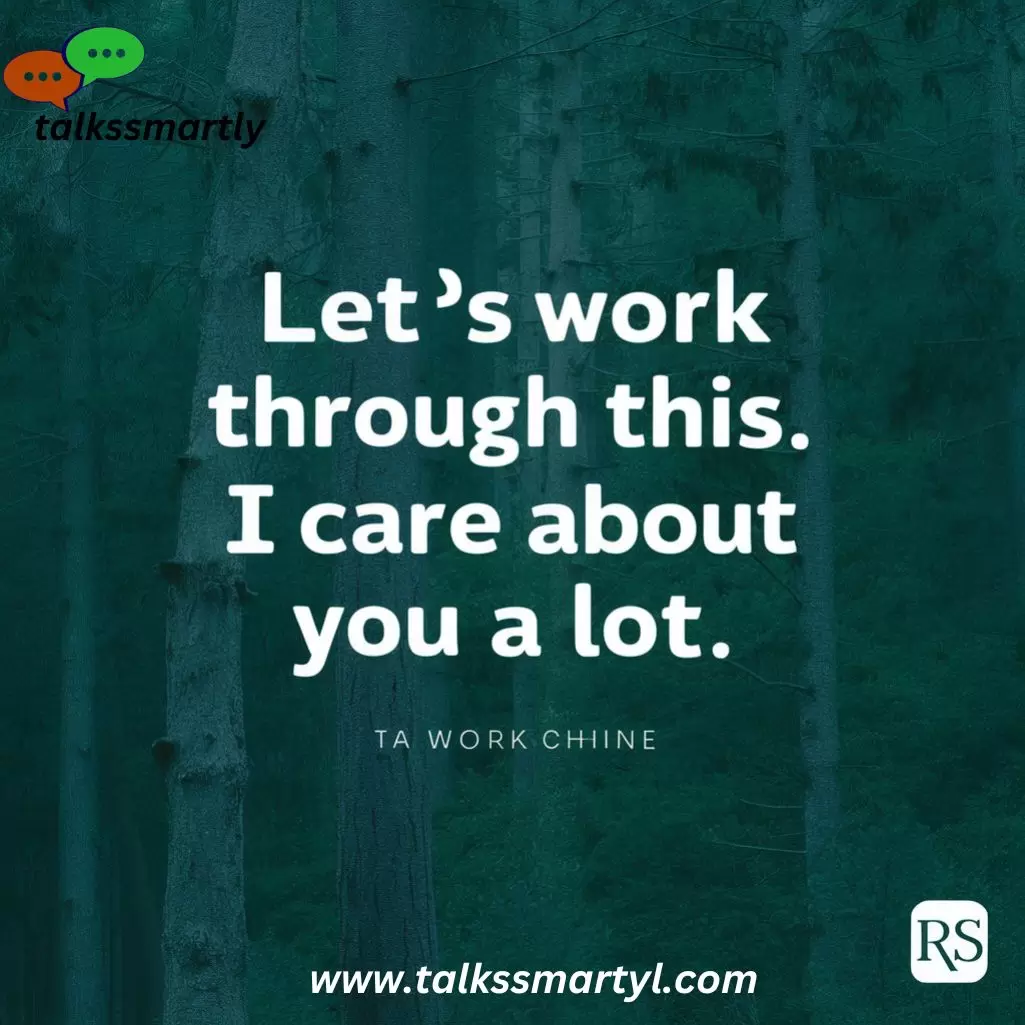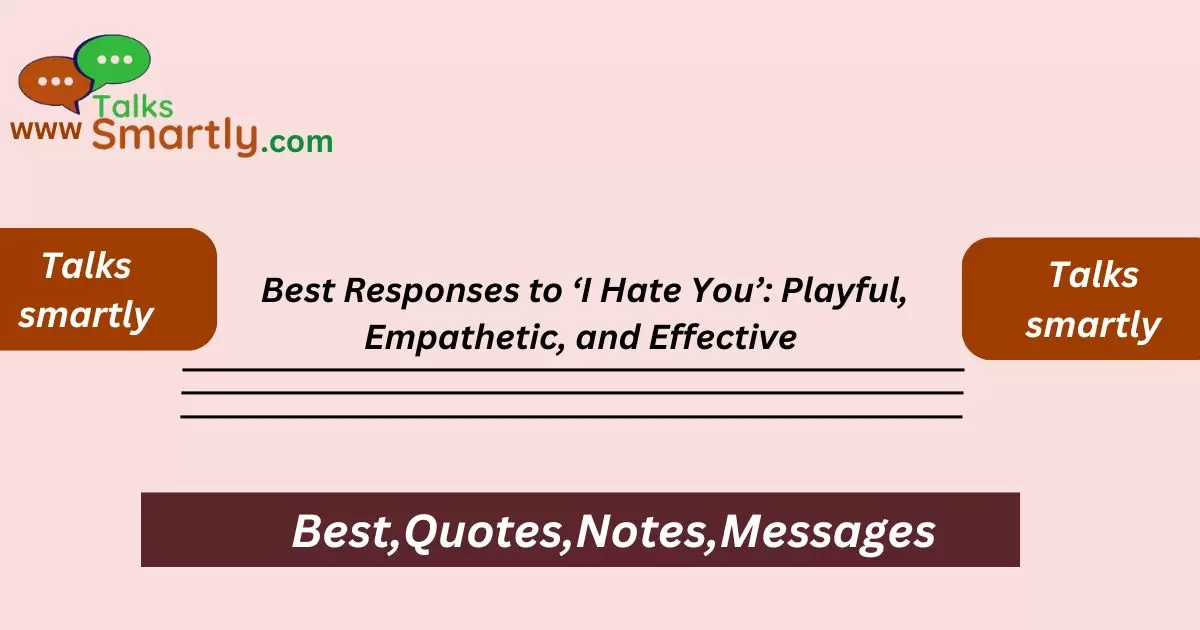Introduction
Respond to “I hate you” with playful, empathetic, and effective replies to defuse tension and strengthen relationships.
Hearing someone say “I hate you” can be really hurtful. It’s important to respond in a way that’s kind and understanding. In this article, we will explore some of the best responses to this phrase. Whether you want to be playful, empathetic, or effective, we’ve got you covered. Let’s learn how to turn a negative moment into a positive one.
Are you ready to improve your communication skills? Read on to discover 50+ responses that can help you handle difficult situations. Don’t let hurtful words bring you down. Learn how to respond wisely and keep the conversation positive.
This article, “50+ Best Responses to ‘I Hate You’: Playful, Empathetic, and Effective,” provides a variety of responses to handle the phrase “I hate you.” We will share playful comebacks, empathetic replies, and effective strategies. Each response is designed to help you navigate tough conversations with grace and confidence.
Playful Responses
1. “You hate me? That’s too bad, I kinda like you!” This response lightens the mood by showing that you don’t take the statement too seriously and still have positive feelings.
2. “Hate is such a strong word, how about ‘dislike’ instead?” This suggests a softer approach, indicating that ‘hate’ might be too intense and maybe ‘dislike’ is more accurate.
3. “Ouch! Did I forget your birthday or something?” Adding humor, this implies that there might be a specific reason for their feelings, possibly something trivial.
4. “Well, that’s a bummer. I was just about to bake you a cake!” This playful remark implies that despite their feelings, you were planning something nice, which might make them rethink their words.
5. “You hate me now, but wait until you see my dance moves!” Bringing in a light-hearted element, it suggests there are still fun and positive things about you they might not have considered.
6. “Wow, you must really love me deep down to say that!” This turns the negative statement into a positive one by suggesting strong emotions often come from deep care.
7. “I guess we won’t be going to that concert together then, huh?” Highlighting a missed opportunity for fun, it indirectly questions whether they really want to miss out.
8. “Hate me all you want, but you still have to put up with me!” This response playfully acknowledges their feelings but asserts that your presence is inevitable.
9. “Do you hate me more than Brussels sprouts?” Comparing their feelings to a commonly disliked food, this adds humor and diminishes the seriousness of their statement.
10. “Does this mean no more movie nights?” By referencing shared enjoyable activities, it subtly reminds them of the good times together.

11. “Well, that’s your loss because I’m awesome!” This confident response shifts the focus to your positive qualities, suggesting they’re missing out.
12. “Oh no! Does this mean we’re not besties anymore?” This playful response hints at the importance of your relationship, making them reconsider.
13. “You must have had a bad day. Want to talk about it?” Showing empathy, it suggests their statement might be due to a bad day, offering to listen and help.
14. “If you hate me, what about your annoying neighbor?” This humorous comparison implies that there might be worse things than you in their life.
15. “Hate is a bit extreme, don’t you think? How about mild irritation?” Suggesting a less intense emotion, it gently challenges the severity of their statement.
16. “Is this because I didn’t share my snacks with you?” Adding humor, it implies a trivial reason might be behind their strong words.
17. “Guess I’ll cancel our karaoke plans then!” Reminding them of fun future plans, it makes them rethink their statement.
18. “Hate me today, love me tomorrow!” This response suggests that feelings can change, hinting at a more positive future.
Empathetic Responses
19. “I’m sorry you feel that way. Can we talk about what’s bothering you?” Acknowledging their feelings, this response opens the door for a constructive conversation.
20. “I didn’t mean to hurt you. Let’s figure this out together.” Expressing regret and a willingness to resolve the issue, it shows you care about their feelings.
21. “Your feelings matter to me. How can I make things better?” This response emphasizes their importance to you and your desire to improve the situation.
22. “I respect your feelings, even if they’re hard to hear.” By validating their emotions, you show respect and a readiness to listen.
23. “I value our relationship and want to understand why you feel this way.” Highlighting the importance of your relationship, it invites them to share their perspective.
24. “I’m here to listen if you want to share what’s on your mind.” Offering a listening ear, this response shows your support and openness.
25. “Let’s work through this. I care about you a lot.” Indicating a willingness to resolve the issue, it emphasizes your care for them.

26. “I never intended to upset you. Can we find a solution?” This response expresses regret and a proactive approach to finding a solution together.
27. “It hurts to hear that. Can we talk about what’s going on?” Acknowledging the pain of their words, it seeks to understand and address the issue.
28. “I appreciate your honesty. Let’s talk about what’s wrong.” By valuing their honesty, it invites a candid discussion to resolve the problem.
29. “I’m really sorry if I’ve hurt you. Let’s talk this through.” Apologizing and suggesting a conversation, it shows your commitment to fixing the issue.
30. “I understand you’re upset. I’m here for you.” Recognizing their emotions and offering support, it shows empathy and care.
31. “I don’t want you to feel this way. How can I help?” This response focuses on alleviating their negative feelings and offers assistance.
32. “I’m sorry you’re feeling this way. Let’s discuss it calmly.” Apologizing for their feelings, it suggests a calm discussion to resolve the issue.
33. “I care about you and want to understand why you feel this way.” Emphasizing your care for them, it invites them to explain their feelings.
34. “Your feelings are valid. Let’s talk about how we can improve things.” Validating their emotions, it suggests working together to improve the situation.
35. “I’m sorry if I did something wrong. Can we talk about it?” Apologizing for any wrongdoing and seeking a discussion, it shows your willingness to make amends.
36. “It’s tough to hear that, but I want to make things right.” Acknowledging the difficulty of their words, it shows your intention to resolve the issue.
37. “I value you and our relationship. Let’s work on this together.” Highlighting the importance of your relationship, it suggests a collaborative approach to fixing things.
Skinny Shaming Comebacks: From Sarcastic to Body Positive
Effective Responses
38. “I hear you. What can we do to resolve this?” This response shows you’ve listened and are ready to take action to resolve the issue.
39. “Thank you for being honest. Let’s address the issue.” Appreciating their honesty, it suggests addressing the problem directly.
40. “I understand. Let’s find a way to move forward.” Acknowledging their feelings, it proposes finding a path to move past the issue.
41. “Your feelings are important. Let’s work on this.” Emphasizing the importance of their feelings, it suggests working together to resolve the issue.
42. “Let’s sit down and discuss what’s bothering you.” Proposing a conversation, it shows your willingness to listen and understand their concerns.
43. “I want to fix this. What can I do to help?” Expressing your desire to resolve the issue, it asks for their input on how to help.
44. “Let’s have an open and honest conversation about this.” Suggesting a candid discussion, it shows your commitment to addressing the problem.
45. “I appreciate your feedback. Let’s improve our relationship.” Valuing their feedback, it suggests working together to strengthen your relationship.
46. “It’s clear something’s wrong. Let’s address it together.” Acknowledging there’s an issue, it proposes a joint effort to resolve it.
47. “I’m committed to resolving this. Let’s talk it out.” Showing your commitment to fixing the problem, it suggests a discussion to work things out.
48. “We can work through this. Let’s start with a conversation.” This response emphasizes that the issue can be resolved through a discussion.
49. “Your perspective matters. Let’s find a solution.” Highlighting the importance of their viewpoint, it suggests finding a solution together.
50. “I don’t want you to feel this way. Let’s fix it.” Focusing on alleviating their negative feelings, it proposes working together to resolve the issue.
51. “Let’s talk about what’s causing these feelings.” Suggesting a conversation to understand the root cause, it shows your willingness to address the issue.
52. “I’m open to discussing how we can improve things.” Showing your openness to a discussion, it suggests working together to improve the situation.

53. “Let’s address the issues and find a way to move forward.” Proposing a joint effort to resolve the issues, it emphasizes moving past them together.
54. “I care about you. Let’s resolve this together.” Highlighting your care for them, it suggests a collaborative approach to resolving the issue.
55. “Your feelings are important to me. Let’s talk about it.” Emphasizing the importance of their feelings, it invites a discussion to understand and address the problem.
When “I Hate You” Calls for More Help
Hearing “I hate you” can be deeply unsettling and may indicate underlying issues that require more comprehensive support. If the statement arises from persistent conflicts, emotional distress, or complex relational dynamics, it’s crucial to seek additional help. Professional counseling or therapy can provide a safe space for both parties to explore their feelings, communicate more effectively, and work through unresolved issues.
Mental health professionals are trained to mediate conflicts, offer coping strategies, and guide individuals or couples towards healthier interactions. Moreover, seeking support from trusted friends or family members can offer emotional backing and perspective.
In situations where the statement is rooted in deeper mental health concerns, such as depression or anxiety, professional intervention is essential to ensure the well-being of everyone involved. Remember, acknowledging the need for help is a strong and positive step towards healing and building a stronger, more understanding relationship.
Conclusion
In conclusion, knowing how to respond to someone who says “I hate you” can make a big difference in maintaining and improving relationships. Choosing the right response depends on the situation and your relationship with the person. Sometimes a playful response can lighten the mood and ease tension.
Other times, an empathetic reply can show you care and are willing to understand their feelings. It’s also important to have effective strategies to handle such intense emotions, which can help resolve conflicts more smoothly. Whether you use humor, empathy, or straightforward communication, your response should be thoughtful and considerate.
Remember, words have power, and choosing the right words can turn a negative situation into a positive one, fostering better understanding and stronger connections. Keep these tips in mind, and you’ll be better prepared to handle those tough moments with grace and confidence.












